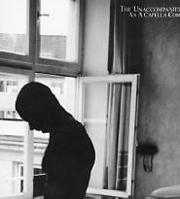“A capella” isn’t an instantly recognizable term. Ask the average man on the street what it means and he’ll probably guess it is a type of fish or an ear-shaped pasta. The correct answer, however, is simply “without instrumental accompaniment.”
Music for voice only hasn’t enjoyed much popularity since Gregorian chant went the way of Debby Boone on the radio. Since the demise of doo-wop, the key proponents of the practice haven’t exactly been “sexy” (as we say in editorial parlance), although there are still instances of note, such as Patti Smith’s “Memorial Tribute” from the 1993 No Alternative compilation or the Kate Bush B-side “The Handsome Cabin Boy.” Today, ditties sung unaccompanied are almost exclusively the domain of ensembles like Rockapella, the Nylons, and the Bobs, whose pasteurized harmonies and zany shtick go over best with MENSA members and high school drama enthusiasts.
Living in Bloomington, Indiana, home of the acclaimed Indiana University School of Music, Jonathan Cargill used to have his own prejudices about music performed a capella. “What I hear the most are those really lame, university-sponsored groups that travel from state to state—or old folks home to old folks home—singing little ditties,” he says.
But thanks to a new CD on Secretly Canadian Records, the label Cargill runs with brothers Chris and Ben Swanson, the resurrection of the “Hot Barbershop Quartet” sales chart in Billboard seems like a distinct possibility. The Unaccompanied Voice: An A Capella Compilation features 24 exclusive voice-only tracks from underground artists including Modest Mouse, Nikki McClure, Songs: Ohia, David Grubbs, and members of God Is My Co-Pilot and Low.
Cargill came up with the idea back in 1997, while working at the college’s Archives of Traditional Music. “Through that, I became very familiar with old folk and field recordings,” he says. “And the majority of those are just Ma and Pa sittin’ on the porch, singing.”
Around the same time, the Secretly Canadian crew became fascinated with a lo-fi legend called Human Scab, “a little kid who came out of the Northwest and just sang, and made gobs of tapes. The Blake Babies sampled him a couple of times.” Cassette-only releases like Human Scab and Thunderhips and Saddle Bags became required listening around the SC offices.
Cargill cites very basic reasons for his fascination with a capella performances: “The fact that it’s so common, and so simple. It’s something even I can do. It’s something I do do—it’s something everybody does.”
Eventually, the creative juices started pumping. “We started talking about how [a capella music] is all around us,” he continues. “We hear our moms sing, we all sing . . . but that rarely gets recorded in any format aside from what you find in archives or a scholarly atmosphere.”
After sending out about 35 requests for submissions and getting back an astonishing number of enthusiastic responses, Cargill felt they’d made the right decision. “A lot of the people who were contributing said, ‘I get asked to do a lot of comps, and this is the first one that’s actually interesting,'” he reveals. “That made me very happy.”
The guidelines for participants were suitably straightforward. “We put no stipulations [on the artists], we just said it’s got to be purely voice. And however people chose to represent that [idea], they could do.”
The final product runs a gamut of styles and emotions, from the Grifters’ hopped- up “Hits Keep Comin'” to the multitracked moaning of Jarboe (ex-Swans/World of Skin) on “And I Name Myself Hag.” Group efforts from Pedro the Lion, Drunk, and Danielson Famile boast innovative arrangements that never seem too clever.
A couple tracks wouldn’t be out of place on a vintage Folkways disc: Richard Buckner & P.W. Long’s “Ain’t No Grave Can Hold My Body Down”; the Scottish drinking dirge “Four Nights Drunk” by Appendix Out; and “Dance Hall Palaces” by Seattle’s Damien Jurado, about the closing of local all-ages venues.
“As a lover of traditional American folk music, the unaccompanied song was nothing new,” says Jurado, who wrote the song for solo voice. “They have been a part of my live set for a long time and will continue to be.”
Sadly, not everyone Secretly Canadian invited opted to pitch in. Demonic diva Diamanda Galas never responded and Jesus Lizard fans will have to keep waiting to hear the a capella debut from David Yow. “He ended up writing me a nice letter saying he didn’t think he was worthy,” confesses Cargill. “He didn’t think his voice was good enough. And I’m like, ‘That’s the whole point.'”
But if singing alone is something “everybody” does, why is there no contribution from Cargill, an accomplished musician in his own right? “I thought about [recording a track],” he admits, chuckling. “But these are people who can do it much better, people I want to hear. Just because I sing doesn’t mean I want to listen to it.”






